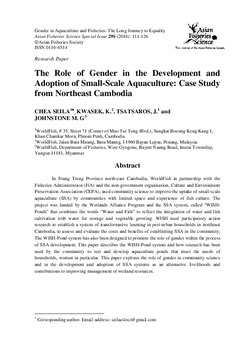The Role of gender in the development and adoption of small-scale aquaculture: Case study from northeast Cambodia

Citation
Chea Seila et al. (2016). The Role of gender in the development and adoption of small-scale aquaculture: Case study from northeast Cambodia. Asian Fisheries Science Special Issue, 29S: 111-126
In Stung Treng Province north-east Cambodia, WorldFish in partnership with the Fisheries Administration (FiA) and the non-government organisation, Culture and Environment Preservation Association (CEPA), used community science to improve the uptake of small-scale aquaculture (SSA) by communities with limited space and experience of fish culture. The project was funded by the Wetlands Alliance Program and the SSA system, called "WISHPonds" that combines the words "Water and Fish" to reflect the integration of water and fish cultivation with water for storage and vegetable growing. WISH used participatory action research to establish a system of transformative learning in peri-urban households in Northeast Cambodia, to assess and evaluate the costs and benefits of establishing SSA in the community. The WISH-Pond system has also been designed to promote the role of gender within the process of SSA development. This paper describes the WISH-Pond system and how research has been used by the community to test and develop aquaculture ponds that meet the needs of households, women in particular. This paper explores the role of gender in community science and in the development and adoption of SSA systems as an alternative livelihoods and contributions to improving management of wetland resources.
Permalink
Date Available
Type
Publisher
Countries
ISSN
0116-6514
Research Themes
Topics